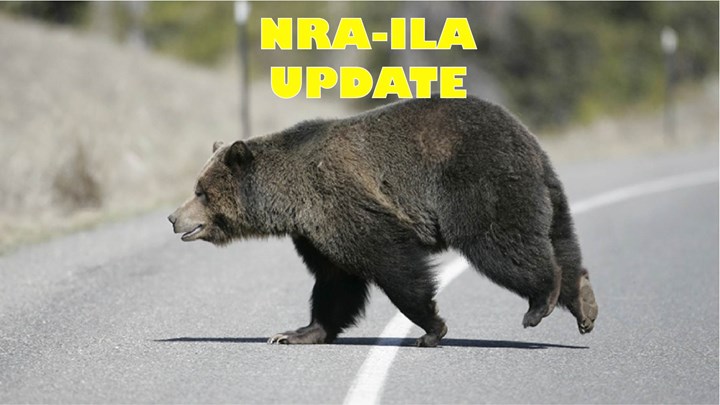
by Brian McCombie - Thursday, January 31, 2019

As NRAHLF.org reported last September, a federal judge not only halted the proposed 2018 grizzly bear hunt in Wyoming, but he eventually returned the grizzly bear to endangered species status. This was despite the fact that the various federal and state agencies involved in grizzly bear management had concluded the big bears were fully recovered under the Endangered Species Act (ESA)—so much so that a limited, sustainable hunt was planned.
In December 2018, attorneys for the U.S. Fish and Wildlife Service (USFWS) filed notice that the agency was appealing the decision returning grizzly bears to ESA status. As the Associated Press reported:
“The appeal…challenges a judge's ruling that restored threatened species protections for more than 700 bears in and around Yellowstone National Park. Protections for the animals had been removed in 2017. When the ruling from U.S. District Judge Dana Christensen came down…Wyoming and Idaho were on the cusp of hosting their first public hunts for grizzly bears in the Lower 48 since 1991. Federal biologists contend Yellowstone-area grizzlies have made a full recovery after a decades-long restoration effort. They want to turn over management of the animals to state wildlife agencies that say hunting is one way to better address rising numbers of bear attacks on livestock.”
If only the threats were to livestock. Last year saw several grizzly bear attacks on humans. As NRAHLF.org also noted, a grizzly bear killed a Wyoming hunting guide and another bear mauled a Montana hunter, while a grizzly in the Yukon Province of Canada killed two people, this time a mother and her 10-month-old daughter.
The National Rifle Association and Safari Club International also have entered into the USFWS’ appeals process as “NGO Intervenors.” The NRA Institute for Legislative Action (NRA-ILA) is currently working on the appellate briefing. Briefings in the case are scheduled to be completed by the end of June, though this could change as the Ninth Circuit Court, which is hearing the appeal, will grant one-month extensions as needed.
The states of Idaho, Montana and Wyoming have also filed notices of appeal.
In a news release, Montana Governor Steve Bullock called for the removal of the grizzly bears’ ESA protections. “With grizzly bear recovery goals met in the Greater Yellowstone Ecosystem and the safeguards in place to ensure healthy populations will persist, it’s time to hand over management to the states,” Bullock said.
Part of that management, under the North American Model of Wildlife Conservation, can involve hunting when wildlife populations are large and prolific enough to sustain a hunt. As noted, grizzly bear numbers have recovered far beyond ESA goals to the point that bears are an increasing threat to people and their property. A hunt is one way to curb the numbers of aggressive bears.
Unfortunately, the anti-hunters have waged a successful campaign of lawsuits against a grizzly bear hunt. As NRAHLF.org contributor Frank Miniter noted in September 2017, anti-hunters have also done a good job of demonizing hunters and casting doubt on hunting as a wildlife conservation tool, with significant help from a mainstream media clearly in opposition to hunting and wildlife conservation.
Don’t expect a quick decision on the appeals case. Considering how many parties are involved, one or more may request an extension. Any additional Federal government shutdowns are also a factor, as Department of Justice attorneys representing USWFS in the appeal can’t work on this case until any shutdown ends.
NRA-ILA will continue to be involved in the appeals process to help protect the rights of hunters and to support the preeminence of science in wildlife conservation and management decisions.
Editor's Note: As covered repeatedly by NRAHLF.org, the United States maintains the most successful wildlife management system worldwide. Known as the North American Model of Wildlife Conservation, the system was adopted as official NRA policy by the NRA Board of Directors in December 2014. Whether through hunters’ licenses, tags and permit fees; voluntary donations to habitat projects; or membership fees to like-minded hunting and wildlife conservation organizations, sportsmen’s dollars are making sure wildlife continues to thrive.
E-mail your comments/questions about this site to:
[email protected]
Proudly supported by The NRA Foundation and Friends of NRA fundraising.
